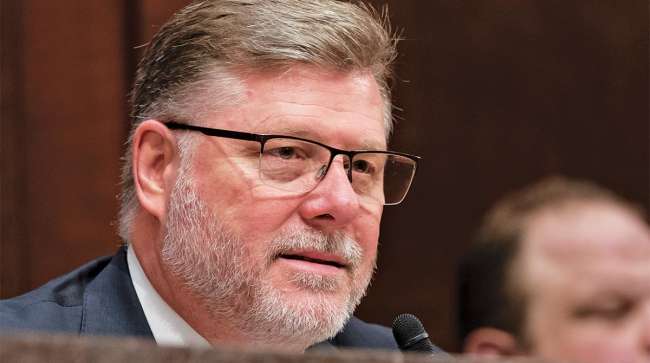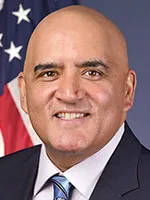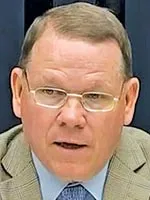Senior Reporter
Rep. Rick Crawford Pursues T&I Chairmanship

[Stay on top of transportation news: Get TTNews in your inbox.]
WASHINGTON — Rep. Rick Crawford, the Arkansas Republican who leads the subcommittee on highways and transit policy in the House of Representatives, recently declared his candidacy for the full transportation committee’s chairmanship.
In the event his party retains governing control of the chamber after the fall elections, Crawford has positioned himself as a viable candidate. Engaging in robust oversight of the Biden administration has become his trademark on the committee.
The ongoing oversight of a climate change-centric requirement for state departments of transportation by the Biden administration marked a turning point for Crawford. In February, he formally pushed back on the measure by relying on a procedural tool to undo the requirement. Dozens of Republicans are endorsing the move, known as a Congressional Review Act.
Specifically, the Federal Highway Administration is requiring state DOTs and metropolitan planning organizations to establish declining carbon dioxide targets. State DOTs and MPOs also are required to issue reports specific to progress toward achieving those targets.
After months of formally pushing back on the FHWA rule as part of his oversight of implementation of the Infrastructure Investment and Jobs Act, Crawford announced his candidacy for the committee’s chairmanship. Notably, he did not support IIJA.
A key argument for Crawford and his colleagues is that 2021’s Infrastructure Investment and Jobs Act, or IIJA, stopped short of authorizing the requirement. Instead, the GOP lawmakers point out the Biden administration activated the requirement.
“We can’t continue to have that,” Crawford told Transport Topics on March 25. “It creates uncertainty in the marketplace. It adds costs — compliance costs and regulatory burdens. And we don’t need those kinds of things happening. So that’s one example. But generally speaking, that’s just the way federal agencies conduct themselves these days.”
He added, “It’s not that they shouldn’t be making rules per se, but, from our perspective, [but] Congress — I think — needs to write tighter legislation, be more clear on the intention and be less tolerant of deviation from that intention. Because invariably some unelected bureaucrat in an agency is going to go, ‘Well, here’s what Congress really meant.’ That’s not necessarily what Congress really meant. But then these rules can get made.”

Bhatt
During a December hearing with FHWA administrator Shailen Bhatt, Crawford had articulated those concerns: “This looks to me like a deliberate attempt to sort of skirt the intent of [the Infrastructure Investment and Jobs Act],” Crawford said. During a back-and-forth with the congressman, Bhatt defended the rule.
In addition to oversight, as full committee chairman Crawford intends to ask colleagues to consider a comprehensive update of the country’s highway policies. A new highway authorization bill would look carefully at the Highway Trust Fund’s longevity. The fund is key for supporting construction and maintenance projects, and insufficient revenue from the federal fuel tax has led Congress to supplement the account. Supporting supply chain connectivity programs, expanding access to truck parking and promoting the freight workforce also would be on the radar during a highway policy reauthorization.
Crawford’s leadership strategy is anchored on adopting themes linked to mobility, opportunity, vision, efficacy and security. As he explained, “It means fixing the areas where we have fallen short, working to address the needs of a modern economy, and protecting this improved system from foreign threats.”
He continued, “Our transportation and infrastructure system impacts every facet of our economy and daily life, from the food you buy at the grocery store, to the clothes on your back, to the airplane flight to grandma’s house for the holidays, to the safe and reliable energy you use to heat your home, and so much more. The work we do on this committee is serious, and it requires a balanced approach from someone willing to work with the other side of the aisle and with hundreds of stakeholder organizations.”

Graves
If Republicans remain in the majority after November’s elections, the caucus’ senior intelligentsia will decide committee leadership roles. Current committee Chairman Sam Graves (R-Mo.) intends to seek another term as the panel’s leader, but he would need a rule waiver to continue as chairman since his caucus imposes committee leadership term limits.
Graves, who is approaching those term limits, has adopted a collaborative management style during his stint as chairman. For instance, the chairman introduced the Congressional Review Act in February alongside Crawford.
“While the infrastructure law included provisions to address transportation related environmental impacts and transportation resiliency, Congress considered and specifically rejected the inclusion of a [greenhouse gas] performance measure requirement during negotiations,” said Graves in February. “The Biden administration needs to implement the law that was written — not a law that it keeps wishing had been written.”
Want more news? Listen to today's daily briefing below or go here for more info:




